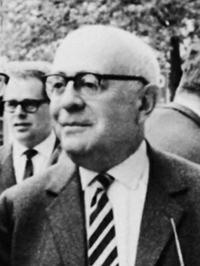Indeed, happiness is nothing other than being encompassed, an after-image of the original shelter within the mother. But for this reason no one who is happy can know that he is so. To see happiness, he would have to pass out of it: to be as if already born. He who says he is happy lies, and in invoking happiness, sins against it. He alone keeps faith who says: I was happy.
theodor W. Adornoquotes
1903 - 1969

While not Jewish himself, Adorno was forced to flee Germany for England and the U.S. during the Nazi occupation. Fascism and totalitarianism became strong themes in his writing as he critiqued civilization’s tendency toward self-destruction, and pondered the dark side of rationalizing humanity. Co-authored with his friend, Horkheimer, Adorno’s best-known work, Dialectic of Enlightenment, further developed the idea that rationalism had become irrational.
In Minima Moralia, he contemplated the dehumanization of civilization caused by the industrial era, and wrote that there was no chance to lead a good, honest life anymore. Mankind had become cogs in a machine, either playing the producer or the consumer, but neither one being free.
He argued that reason was a tool used to control people. Human emancipation, he said, could only be found through creativity and the pursuit of individual autonomy and happiness.
When he returned to Germany in 1949, he and his friend, Horkheimer, rebuilt the Institute for Social Research and the Frankfurt School of critical theory. His endeavors were central to Germany’s intellectual revival post-World War II.
Jazz is the false liquidation of art — instead of utopia becoming reality it disappears from the picture.
To those who no longer have a homeland, writing becomes home.
Art respects the masses, by standing up to them for what they could be, rather than conforming to them in their degraded state.
The culture industry perpetually cheats its consumers of what it perpetually promises. The promissory note which, with its plots and staging, it draws on pleasure is endlessly prolonged; the promise, which is actually all the spectacle consists of, is illusory: all it actually confirms is that the real point will never be reached, that the diner must be satisfied with the menu.
The triumph of advertising in the culture industry is that consumers feel compelled to buy and use its products even though they see through them.
Talent is perhaps nothing other than successfully sublimated rage.
Art is the social antithesis of society, not directly deducible from it.
Of the world as it exists, it is not possible to be enough afraid.
Thus is order ensured: some have to play the game because they cannot otherwise live, and those who could live otherwise are kept out because they do not want to play the game. It is as if the class from which independent intellectuals have defected takes its revenge, by pressing its demands home in the very domain where the deserter seeks refuge.